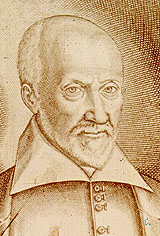Pierre Charron
Pierre Charron (* 1541 in Paris ; † November 16, 1603 ibid) was a French philosopher , theologian and representative of skepticism .
Live and act
Pierre Charron was born in Paris as one of 25 children of a bookseller. He studied law in Orléans and Bourges and received his doctorate in 1571. For a while he worked as a lawyer. After working as a lawyer and subsequent study of theology , Charron was ordained a priest in 1576 and worked u. a. as court preacher to the French Queen Margaret of Navarre ( Margaret of Valois ). Despite his success as a theological advisor in several dioceses and as a canon in Bordeaux, he tried to retire to a monastery in 1589, but was refused due to his age. In the same year he met the French essayist Michel de Montaigne, whose close friend and student he became. At the invitation of the Archbishop of Bazas , Arnaud de Pontac (1530-1605), he moved to the southwest of the country. From 1576 to 1594 he lived in Bordeaux . There he was canon and master of the Saint-André cathedral and met Michel de Montaigne . In late 1588 to early 1589 he traveled to Saintes and Angers . There, his connection with the Ligue catholique caused a certain resentment towards him. From 1594 to 1600 it was under the protection of Antoine Hébrard de Saint-Sulpice , Bishop of Cahors . His first book led to his being elected deputy to the general assembly of the clergy, for which he was then high chancellor.
Charron's philosophical works are strongly influenced by the skepticism of the philosopher Michel de Montaigne . Both were friends. The main work of Charron is considered to be the work completed in 1601 and consisting of three volumes under the title Traite de la sagesse . In De la sagesse , Charron examined the possibility of knowledge outside of revealed truths and came to the conclusion again that the wise man had total doubts because his mental faculties were unreliable. Such skepticism, according to Charron, has two advantages: it frees people from prejudice and it frees them to receive revealed truths. Consequently, the skeptic cannot be a heretic either because he cannot have false opinions.
It was from Montaigne that Charron acquired his skeptical tendency, coupled with traditional Roman Catholicism, which was mentioned in his two main works: Les Trois Vérités (1593; "The Three Truths") and De la sagesse (1601; On Wisdom). In the first, intended as a counter-reformation against the Reformed theology of John Calvin , Charron asserted that the nature and existence of God were not discernible because of the infinity of God and the weakness of man. Belief, not reason, is necessary for acceptance of Christianity and only the authority of the traditional Roman Catholic Church can compensate for the human weaknesses inherent in the Reformer's attempts to know God.
In his moral theory, Charron presented the skeptic as a person who, if he had not received divine commands, lived according to nature. By constructing a “noble savage” who drew his moral guidelines from the natural world, Charron became one of the first modern ethical theorists to lay the foundation for a morality outside of religion.
Works (selection)

- Trois Vérités. (orig. Les trois veritez ) Cahors, (1593)
- Discours chrétiens. Bordeaux (1600)
- De la sagesse. Trois livres Bordeaux, (1601)
- Œuvres complètes. Paris, (1635)
literature
- Friedrich Wilhelm Bautz : Charron, Pierre. In: Biographisch-Bibliographisches Kirchenlexikon (BBKL). Volume 1, Bautz, Hamm 1975. 2nd, unchanged edition Hamm 1990, ISBN 3-88309-013-1 , Sp. 985.
- Claudiu Gaiu: La prudence de l'homme d'esprit. L'éthique de Pierre Charron. Préface de Denis Kambouchner, Zeta Books, Bucharest, 2010
- Jean-Pierre Cavaillé: Pierre Charron, "disciple" de Montaigne et "patriarche des prétendus esprits forts". Les Dossiers du Grihl in Les dossiers de Jean-Pierre Cavaillé: Libertinage, athéisme, irréligion. Essais et bibliographie. Paris: Groupe de Recherches Interdisciplinaires sur l'Histoire du Littéraire (EHESS), (2006). [3]
Web links
- John Sellars: Internet Encyclopedia of Philosophy: Neo-Stoicism. University of the West of England, United Kingdom [4] on iep.utm.edu
- Rafael V Order of Jiménez: Francisco Sánchez, el escéptivo: breve historia de un filósofo desenfocado. Madrid 2012, p. 28 ( PDF; 2.2 MB, 55 pages on larramendi.es)
Individual evidence
- ↑ The New Schaff-Herzog article on Pierre Charron
- ^ Antoine Thomas (ed.): Annales du Midi. A. Pegard, Paris 1919–1920, p. 103 [1] on archive.org
- ↑ Pierre Charron, Encyclopædia Britannica [2]
| personal data | |
|---|---|
| SURNAME | Charron, Pierre |
| BRIEF DESCRIPTION | French philosopher and theologian, advocate of skepticism |
| DATE OF BIRTH | 1541 |
| PLACE OF BIRTH | Paris |
| DATE OF DEATH | November 16, 1603 |
| Place of death | Paris |
